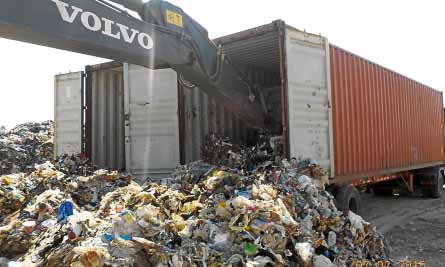
CANADA TRASH This 12-meter container contains mixed household trash misdeclared as plastic and was disposed of by the Bureau of Customs on a private landfill in Capas town, Tarlac province, in 2015. —METRO CLARK WASTE MANAGEMENT CORP.
CITY OF SAN FERNANDO, PAMPANGA, Philippines — Exactly how many containers of garbage from Canada will the Philippines ship back on or before May 15?
As that deadline imposed by Finance Secretary Carlos Dominguez III on the Bureau of Customs after President Rodrigo Duterte threatened war on Canada over the garbage approaches, a discrepancy has surfaced: Eight containers are missing.
Aileen Lucero, national coordinator of EcoWaste Coalition, e-mailed the information to the Inquirer on Monday, saying she raised the matter based on the customs bureau’s count.
The Ontario-based Chronic Inc. exported 103 containers of garbage to Manila in 2013 and 2014, according to Customs Collector Erastus Sandino Austria.
Of the number, at least 55 were consigned to Chronic Plastics and 48 to Live Green Enterprises, Austria said in reply to EcoWaste’s letter of inquiry on the remaining containers in the Philippines. What remained intact are 69 containers, he said in the same letter.
Austria said 67 containers were being held at Subic Bay International Terminal Corp. (SBITC) and two were impounded at Manila International Container Terminal (MICT).
There was no information on the condition of the containers or who had been paying SBITC and MICT for the space these occupied.
‘Locally disposed of’
Austria said without elaborating that 34 containers had been “locally disposed of.”
But only 26 containers were emptied into the landfill of Metro Clark Waste Management Corp. (MCWMC) at Barangay Kalangitan in Capas, Tarlac, in July 2015, its president, Rufo Colayco, said on Monday.
EcoWaste is “keen to know what happened to the Canadian waste from the eight containers,” Lucero said.
“The authorities need to tell the public when, where and how the waste [was] disposed of. We, the people, have the right to know,” she said.
Colayco said the customs bureau had brought eight more containers but that these were padlocked by then Tarlac Gov. Victor Yap.
He said he could not remember if it was then Customs Commissioner Alberto Lina who took back the sealed containers.
It was Lina, he said, who asked him to accept 50 of 103 containers after their owner obtained a court order instructing the customs official to “dispose of the contents in a proper disposal site and return the containers to their owners.”
“I was extremely reluctant to agree, but Lina had been given by the Department of Environment and Natural Resources (DENR) an official finding that the trash was recycled plastic that qualified for legal international trade under the Basel Convention,” Colayco said.
But the DENR said 64 percent of the intercepted shipments were “baled municipal solid waste, or garbage destined for immediate local disposal and cannot be recycled.”
Illegal traffic of waste
Last month, the Pacific Center for Environmental Law and Litigation issued a legal opinion finding illegal traffic of waste and that Canada had violated the Basel Convention.
“Almost immediately after the first 26 containers were unloaded at the MCWMC disposal site in Tarlac, the provincial government stopped any further disposal,” Colayco said.
He added: “MCWMC promptly complied and immediately thereafter, returned eight containers that arrived in the midst of unloading the first 26. In contradiction of the official DENR report which cleared the garbage for disposal, environmentalists declared the garbage toxic. MCWMC has had absolutely no further involvement in the matter.”